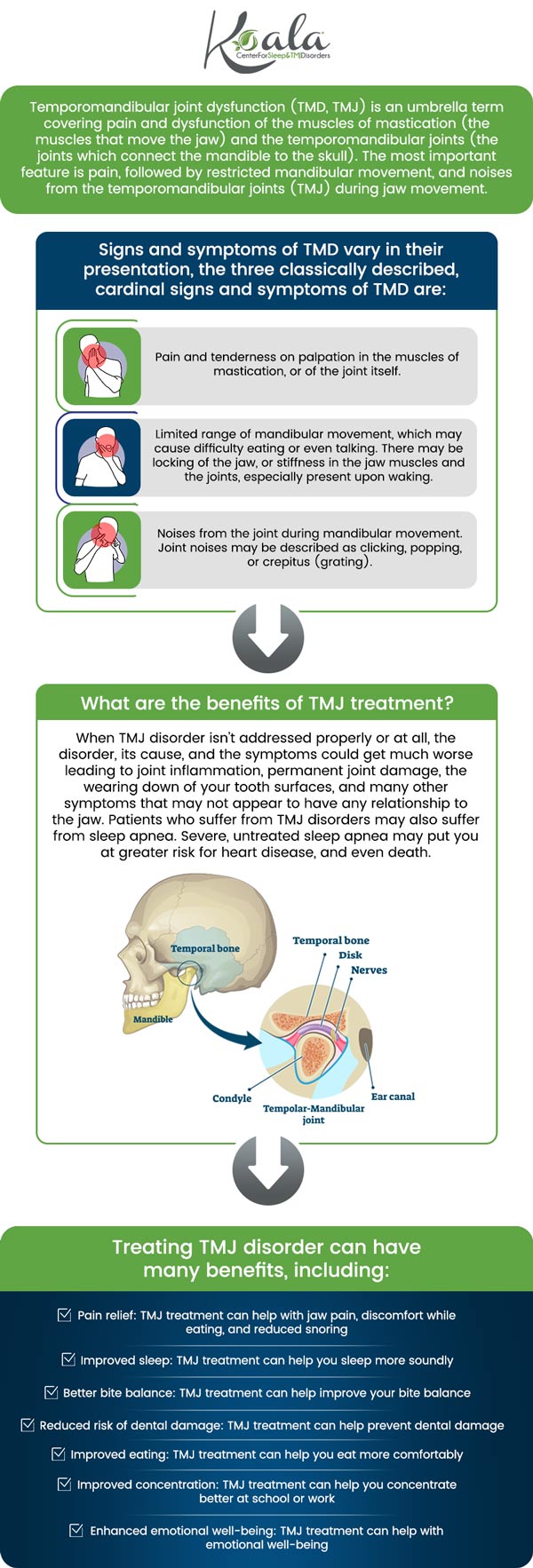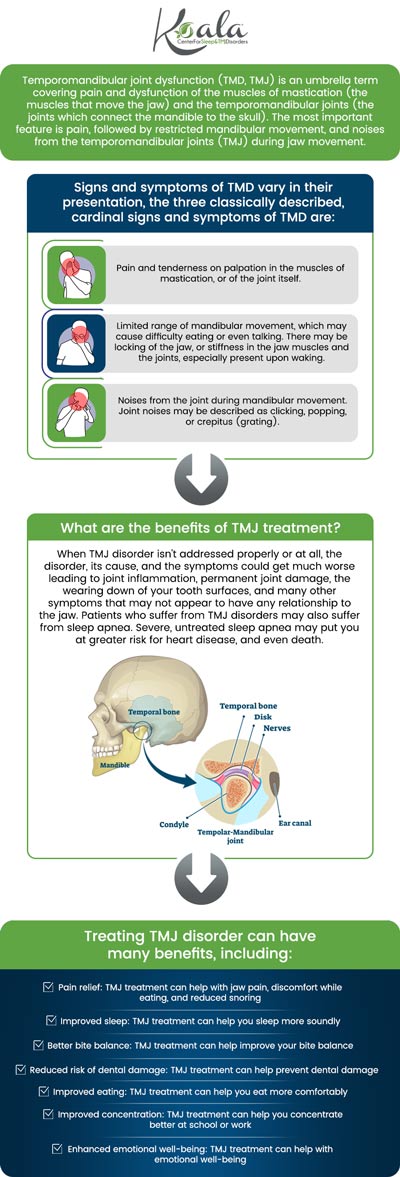Symptoms of TMJ Disorders in Mishawaka IN
Symptoms of TMJ disorders include jaw pain, headaches, clicking sounds, and difficulty chewing. At Koala® Center for Sleep & TMJ Disorders, our team provides personalized care to diagnose and treat these symptoms, helping you find relief and improve your quality of life. For more information, please contact us or request an appointment online. We are conveniently located at 230 E. Day Rd., Suite 150 Mishawaka, IN 46545.


Table of Contents:
What are the most common signs of TMJ disorders that people should be aware of?
How can jaw pain and headaches be linked to TMJ disorders?
Can earaches and tinnitus be symptoms of a TMJ disorder?
How do symptoms like jaw clicking and limited movement indicate a TMJ issue?
We understand how disruptive temporomandibular joint (TMJ) disorders can be to your daily life. TMJ disorders often present with several noticeable symptoms that should not be ignored. Common signs include jaw pain or tenderness, which may be felt in the joint area, around the ear, or along the jaw muscles. Many of our patients report difficulty or discomfort when chewing, talking, or simply opening and closing their mouths.
You may also hear clicking, popping, or grating sounds in your jaw joint during movement. While these sounds are not always painful, they can indicate an underlying issue. Some individuals experience jaw locking or catching, making it hard to fully open or close the mouth.
TMJ disorders can also cause frequent headaches, facial pain, or aching sensations that radiate to the neck and shoulders. Swelling on the side of the face and changes in the way your upper and lower teeth fit together are further signs to watch for.
If you notice any of these symptoms—especially if they persist or worsen over time—the team at Koala Center for Sleep & TMJ Disorders is here to help. Our experienced providers specialize in the diagnosis and management of TMJ disorders, offering personalized treatment plans to help you find relief and restore comfort in your daily life. Don’t let TMJ symptoms interfere with your well-being—contact us today for a comprehensive evaluation.
At Koala Center for Sleep & TMJ Disorders, we frequently see patients who struggle with jaw pain and headaches—two symptoms that are often closely linked to temporomandibular joint (TMJ) disorders. The TMJ is the joint that connects your jawbone to your skull, playing a vital role in everyday activities like talking, chewing, and yawning. When this joint becomes inflamed or is not functioning properly, it can result in a condition called TMJ disorder (TMD).
The relationship between jaw pain and headaches in TMJ disorders is significant. The muscles and nerves surrounding the TMJ overlap with those in the face, head, and neck. Dysfunction in the TMJ can lead to muscle tension and strain, which not only causes discomfort in the jaw but can also radiate to the temples, forehead, and even the back of the head—manifesting as recurrent headaches.
TMJ disorders can also cause what’s known as referred pain. Since the nerves serving the TMJ and its associated muscles also supply the head and neck, irritation or compression from TMJ dysfunction can send pain signals to these areas. As a result, TMJ related headaches often mimic tension-type headaches and may worsen with jaw movement, such as chewing or speaking.
Other common symptoms of TMJ disorders include clicking or popping sounds in the jaw, limited mouth opening, and facial pain. Our team specializes in diagnosing and treating TMJ disorders to address these symptoms at their source. We offer comprehensive evaluations and individualized treatment plans designed to relieve jaw pain, reduce headaches, and improve your quality of life.
Yes, earaches and tinnitus can indeed be symptoms of a temporomandibular joint (TMJ) disorder. The TMJ is the joint that connects your jawbone to your skull, located just in front of each ear. When this joint or the surrounding muscles become inflamed or misaligned, it can result in a variety of symptoms, some of which may not seem directly related to the jaw.
Earaches associated with TMJ disorders often occur because the joint is so close to the ear canal. Inflammation or dysfunction in the TMJ can lead to referred pain in the ear, making it feel sore or achy—even when there is no infection or direct ear problem. Similarly, tinnitus, which is the perception of ringing or noise in the ears, can also be linked to TMJ disorders. The muscles and nerves around the TMJ are connected to those in and around the ear, so dysfunction in the jaw joint can sometimes disrupt normal auditory processing and result in tinnitus.
At Koala Center for Sleep & TMJ Disorders, our team specializes in diagnosing and treating TMJ disorders and related symptoms, such as earaches and tinnitus. If you are experiencing ear pain or ringing in your ears—especially if you also have jaw pain, clicking or popping sounds when moving your jaw, headaches, or difficulty chewing—it may be time to seek expert care. Our experienced providers use advanced diagnostic tools and personalized treatment options to help you find relief and improve your quality of life.
Jaw clicking and limited jaw movement are often signs of issues with the temporomandibular joint (TMJ)—the joint that connects your lower jaw to the skull and allows for essential movements like talking, chewing, and yawning. We frequently see patients who experience clicking, popping, or grating sounds when opening or closing their mouths. These sounds can be a sign that the TMJ is not functioning properly and may be caused by a displaced cartilage disc or irregular movement within the joint.
When jaw movement is restricted—making it difficult to fully open or close your mouth—it may indicate inflammation, a mechanical blockage, or muscle dysfunction related to the TMJ. These limitations are often accompanied by pain, jaw tenderness, or even headaches. Such symptoms can result from various underlying causes, including injury, arthritis, teeth grinding (bruxism), or jaw misalignment.
At Koala Center for Sleep & TMJ Disorders, our team specializes in diagnosing and treating TMJ disorders. Jaw clicking and reduced mobility are important warning signs that shouldn’t be ignored. If you notice these symptoms—especially if they persist, worsen, or are accompanied by significant pain or difficulty eating and speaking—we encourage you to schedule an evaluation with us.
Early intervention can help prevent further joint damage and significantly improve your comfort and quality of life.
Let our experienced professionals at Koala Center for Sleep & TMJ Disorders help you find relief from TMJ-related symptoms and restore healthy jaw function. For more information, please contact us today or request an appointment online. We serve patients from Mishawaka IN, Woodland IN, Granger IN, Ardmore IN, Notre Dame IN, and surrounded areas.

Additional Services You May Need
▸ KoalaKIDZzz®
▸ Sleep Apnea
▸ Snoring
▸ TMJ Disorder
▸ Fatigue
▸ Sleep Disorders
▸ Weight Loss
▸ CPAP Alternative
▸ Oral Appliances




